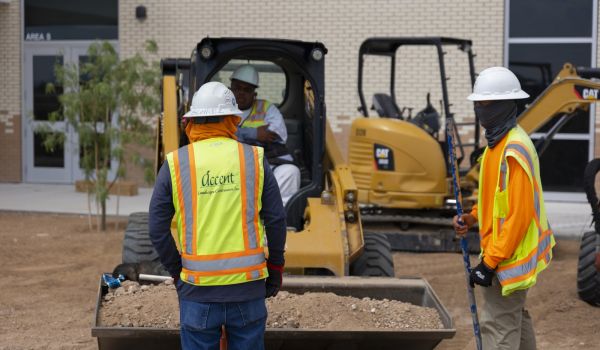Overlooking New York’s East River is a tiny peninsula off the northwest tip of Queens known as Hallets Point. It shares the same name with the poorest neighborhood of the borough, just a little to the south, a high-poverty pocket of middle-class Astoria. It’s also on the cusp of robust residential development that stands to forever alter its makeup.
At a presentation to community members last year, an architect of one of two proposed mixed-use megaprojects described the peninsula changing from a place “cut off from Astoria” and a “desolate eyesore,” into a waterfront site that will be “one of the most magical, outstanding sites in New York City.”
For many nearby public housing residents, the proposed transformation had all the makings of a familiar script: development and upheaval, followed by wealth and higher-paying jobs open predominantly to newcomers and increased inequality.
However, a pioneering community benefits arrangement — one that sets aside quality jobs for local residents both during and after construction — could see “gentrification” play out differently in Hallets Point.
Astoria Cove has had its run-ins with controversy, but prior to city council’s sign-off on the real estate project last November, essential concessions were leveraged from the developer, Alma Realty. Among them: Alma had to refurbish a local park and use union labor during construction, and upon completion, employ a cooperatively owned security company.
“That was very interesting and novel,” says Christopher Michael, executive director of the New York City Network of Worker Cooperatives. “A part of the criteria for having a real-estate development project approved was to agree to give preference to a worker cooperative and only do certain business with a worker cooperative.”
Details released to the public in July highlight just how novel: The security company that was selected, On Point Security, will be the city’s first-ever worker co-op controlled by public housing residents.
To start, community development nonprofit Urban Upbound “owns” On Point Security, which launched this summer. But true to the work-to-own model, control will transition to the workers in short order. “Our framework is one year,” says On Point Security general manager Fritz Vincent, who isn’t a resident of public housing and won’t have an ownership stake, but has 25 years of experience in the security industry to help train the employees.
Vincent is versing the team in everything from anti-terrorism tactics to the administrative duties of a cooperative — background on being both guards and owners. “The pathways to ownership will consist of taking classes in business management, what it takes to run a cooperative, managerial classes. All while working, while receiving pay,” says Vincent. Through this coursework, they’ll obtain credits that will lead to becoming shareholders.
There are seven men currently in the program, and another 23 in the pipeline. All have experience or demonstrated interest in security and business ownership, and they’re all tenants of the New York City Housing Authority. (NYCHA’s a partner in the effort, along with financial backer Citi.) All of On Point Security’s workers live specifically in NYCHA housing in Queens, but Urban Upbound’s long-term co-op plans include expansion to all five boroughs.
“This is a model that we believe can build a pathway out of poverty, a new approach to wealth creation for neighborhoods undergoing economic development,” says Urban Upbound’s Amir Bassiri.
Councilman Costa Constantinides, who represents Astoria, shares the sentiment. “This is giving men and women the opportunity to be their own boss,” Constantinides says. “It’s teaching them how to build equity and become an owner of their own business. It’s really taking a holistic approach to financial health and lifting the residents of public housing up.”
Popularized in Europe during the 1970s and ’80s, there are more than 300 co-ops in the United States. They’ve received recent attention for supporting equitable wages and business practices, thanks to successful examples like Cleveland’s Evergreen Cooperatives. Though other cities have tried to replicate the Cleveland model with varying degrees of success, Rochester, New York’s mayor recently eyed Evergreen as a poverty-fighting solution. Last year, New York’s city council allocated $1.2 million to encourage more co-ops — a first for a U.S. city.
Urban Upbound expects On Point Security to be the first of many co-ops it launches (the group is also researching grocery stores, green construction and daycare), and the Astoria Cove agreement sets a notable precedent. If it’s replicated amid New York’s growing real estate boom, there could be major benefits for workers, says Christopher Michael: “In the future, every new development that the city approves could have to contract with On Point Security or an as-yet-to-be-named worker co-op security company.”
The Equity Factor is made possible with the support of the Surdna Foundation.

Malcolm was a Next City 2015 equitable cities fellow, and is a contributing writer for the Fuller Project for International Reporting, a nonprofit journalism outlet that reports on issues affecting women. He’s also a contributing writer to POLITICO magazine, Philadelphia magazine, WHYY and other publications. He reports primarily on criminal injustice, urban solution and politics from his home city of Philadelphia.

















